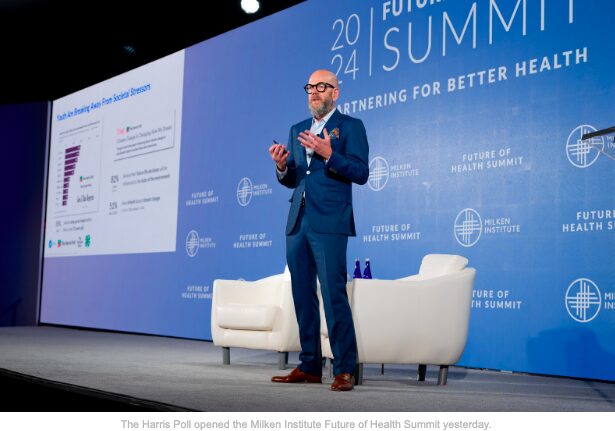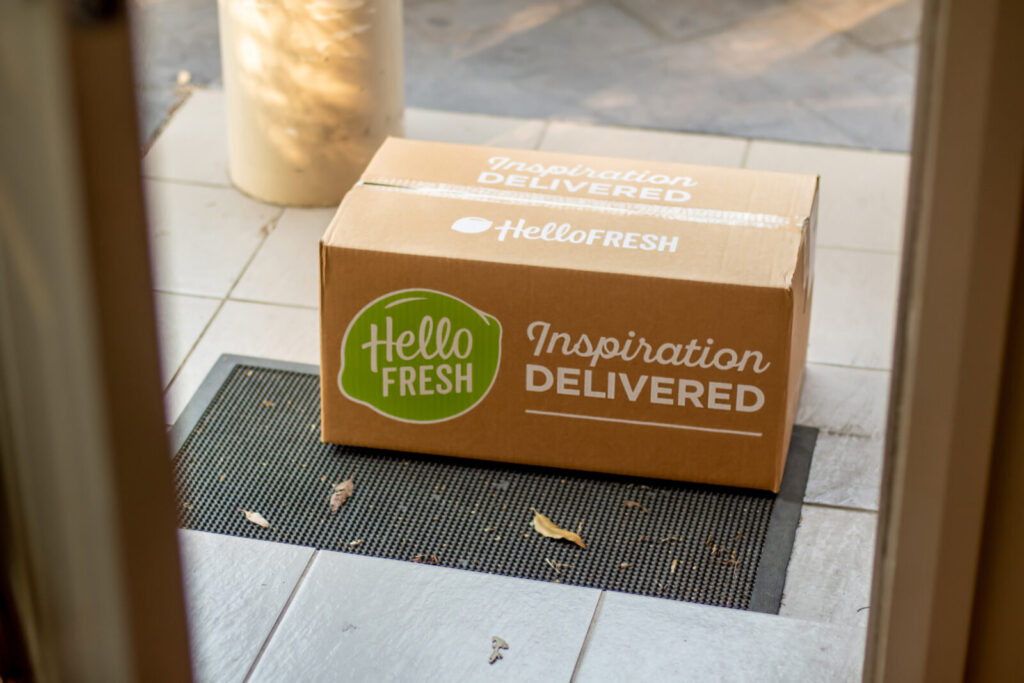Brief • 4 min Read
The Future of Health, Feelings Matter More Than Facts, Retirement’s Gender Gap, and How Consumers Decided The Election.
The latest trends in society and culture from The Harris Poll
Good afternoon from New York, D.C., or Atlanta. We can’t say for sure. We’ve been on the road presenting at Delta’s Marketing Summit and The Milken Institute’s Future of Health Conference.
Do you feel a certain vibe in a brand, a show, or a person? In today’s attention-scarce economy, feelings matter more than ever, and Harris Poll’s CSO Libby Rodney and MD Abbey Lunney show you how to be specific about what you want people to feel in their latest The Next Big Think! Substack. Great read!
This week, we have four new stories:
- We opened yesterday’s Milken Institute Future of Health Summit with a talk on the patient’s perspective of a system that needs overhaul.
- In a Guardian-Harris Poll, most Americans reject upbeat economic news.
- Retirement, like most things, has a gender gap (Transamerica Institute).
- Consumers decided the election. And brands and companies can prosper if they listen.
We Need Partnerships To Fix Healthcare: Milken Institute-Harris Poll
The Harris Poll joined the best minds in the world at the Milken Institute’s Future of Health Summit. The public’s message is evident: We want a better healthcare system that works for more people. Providers, payers, and patients need better communication, coordination, and aligned incentives to get there. Check out our opening plenary here.

- Left on their own: (66%) of Americans say they have to be responsible for their health because no one else seems to care.
- Social media has filled the void of health professionals: (52%) of Americans say following social media health and wellness trends is more accessible than trying to connect with medical professionals.
- Quality care isn’t a guarantee: Over half of BIPOC patients report receiving poor quality care within the last year (55%, +11%-pts) and have needed to seek a second opinion after their concerns were dismissed by their original HCP (52%, +7% %-pts). There’s a 47%-pt gap between Black and White Americans on the statement, “My race determines the quality of care I receive.”
- It’s time for partnerships: (86%) of Americans are ready to work with their doctors and health professionals to create change, yet (57%) worry there won’t be systemic change for many years.
Takeaway: Creating change in healthcare is more necessary than ever as we continue to face a global aging population, a rise in chronic disease conditions, and deep disparities in healthcare. Forming cross-sector partnerships will be needed to drive systemic change in healthcare and achieve better health for all—something that even patients are ready to do. Check out the full findings by downloading the presentation and data here.
The Economic Disconnect: The Guardian-Harris Poll
While the last few months have been filled with robust economic reports, Americans aren’t feeling it, as our latest Guardian collaboration shows.
- Nearly (50%) of Americans believe the country is currently in a recession. In reality, the stock market has been hitting record highs.
- And over (60%) believed that inflation was increasing. It ticked up yesterday but is at nearly pre-pandemic levels.
- The lived experience doesn’t match the rosy reports: (73%) said it was hard to feel good about any positive economic news when they felt financially squeezed each month.
- Mom and Dad were better off: (42%) of Americans said they are not financially better off today than their parents were at their age.
Takeaway: So why do economists and everyday Americans seem to live in two different realities? The answer is how they view inflation. What economists call a soft landing is opposed to ordinary Americans, who see themselves in the middle of turbulence. Inflation is personal and persistent. Every week, it’s changing your benchmark.
Retirement’s Gender Gap: Transamerica Institute-Harris Poll
Women have made great strides in educational attainment and access to career opportunities in recent decades. Yet, despite this progress, women are still at greater risk than men of failing to achieve a financially secure retirement in new Harris data with the Transamerica Institute.
- Women workers dream of an active and fulfilling retirement, including travel (70%), spending more time with family and friends (60%), pursuing hobbies (49%), and more.
- Yet, less than a fifth (16%) are “very confident” that they could fully retire with a comfortable lifestyle.
- Women have a median of $44,000 in total household retirement savings, with Boomer women saving more ($98k v. Gen X: $61k, MLS: $37k, Gen Z: 21%).
- Lacking support: Only (29%) of women currently use a professional financial advisor, and fewer (17%) report frequently discussing saving, investing, and retirement planning with friends and family.
Takeaway: “Our research explores the attitudes and challenges faced by women, reveals pain points, identifies actionable opportunities, and serves as a societal call to action for improving their retirement security,” says Catherine Collinson, CEO and president of Transamerica Institute and TCRS. “Factors including the gender pay gap and time out of the workforce for parenting and caregiving can hinder a woman’s lifetime earnings, retirement savings, and government and employer benefits. Moreover, women tend to live longer than men, so they have an even greater need to save for older age.”
In The End, Consumers Voted The Loudest
By John Gerzema (November 11th, 2024)
If you’re a marketer or communicator, the 2024 election should embolden you regardless of your politics. American voters reminded us that they’re consumers, and more of them want in on the American Dream. This aspiration is an important signal, and if we listen to it, we can see great promise for economic growth and more robust businesses and brands.
This election went to Trump because the nation’s happiness is measured in purchasing power. In our January Axios-Harris Poll Vibes survey, (59%) of shoppers were triggered by going to the grocery store. In October, personal finances were worsening for half (47%) of voters surveyed in our Harvard CAPS-Harris Poll. This sentiment was felt most strongly among Hispanic (49%) voters.
It’s no surprise that Trump’s massive support among Latino voters surged — especially among the working class. In July, Axios-Harris polls I shared at the RNC and DNC found that struggling Latino voters prioritized inflation, housing affordability, wages/jobs, and border security, which was internalized as personal job security. With (64%) holding negative American sentiment toward China, tariffs were appealing to voters as a way to safeguard blue-collar jobs from low-cost imports.
Across the globe, consumers are frustrated with post-COVID inflation and punishing incumbents. And it’s not just politicians facing backlash: Consumers are blaming companies, too. In a May Harris survey, (71%) of company reputations declined, with Americans blaming them for passing along higher prices and pocketing profits.
Growing economic and social division along educational lines left many feeling marginalized and financially insecure, seeking broader access to better-paying jobs, financial security, and a sense of stability and safety. Many felt unheard and excluded in today’s economy and didn’t associate their pocketbooks with its growth. In a spring poll we conducted with The Guardian, a majority of Americans thought the S&P was down (rather than up), unemployment at a record high (rather than low), and the economy in recession (when it was not). To Americans, feelings matter more than facts: Three-quarters (76%) told us, “Economists may say things are getting better, but I’m not feeling where we live.”
Americans (especially those without college degrees) made it clear they feel left behind, unheard, and unable to thrive in an evolving information-based economy increasingly shaped by globalization, AI, high housing costs, and sticky prices.
So, two things can be true at once: Americans are sour on the economy, but they are also aspirational. In a climate of disconnection and distrust, businesses that listen to the kitchen table dreams behind the ballot box results will be well-positioned to match values with untapped audiences who just told us very loudly what they want.
Subscribe for more Insights
Subscribe to our newsletter for the latest trends in business, politics, culture, and more.
Related Content









